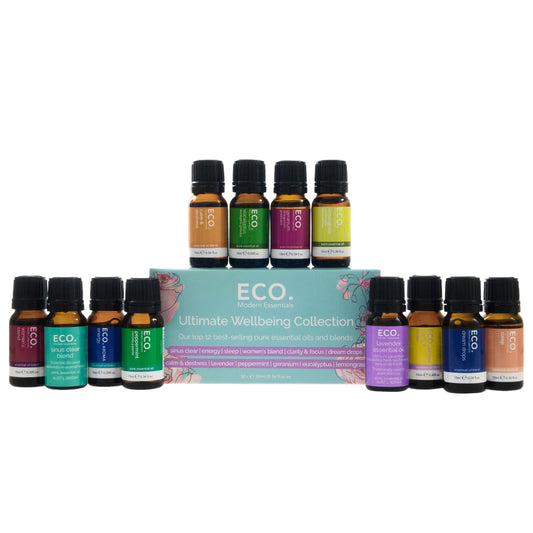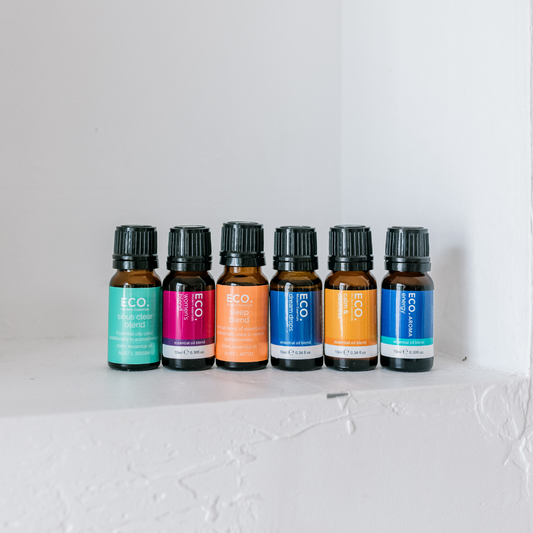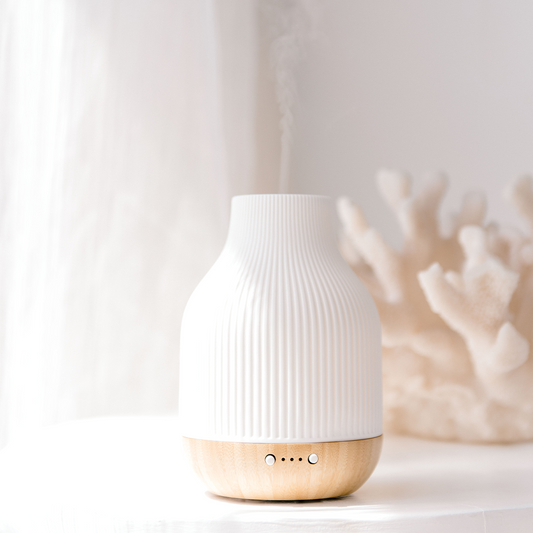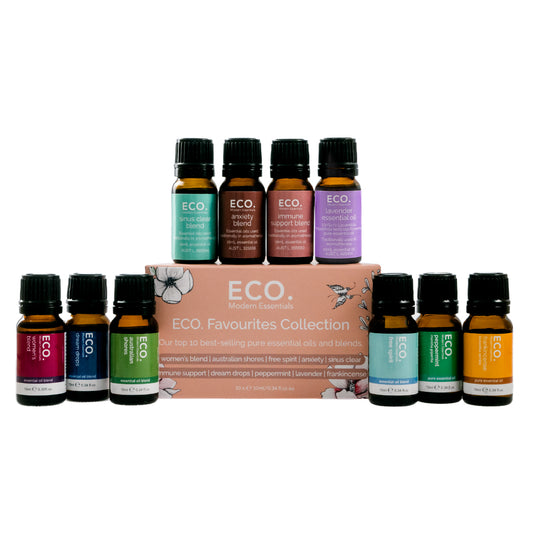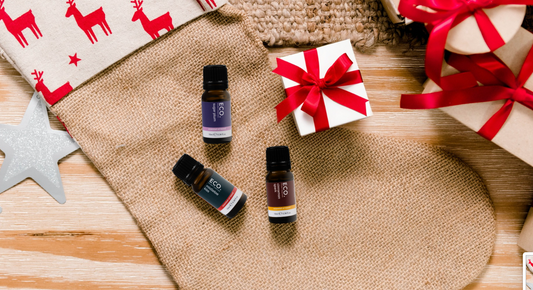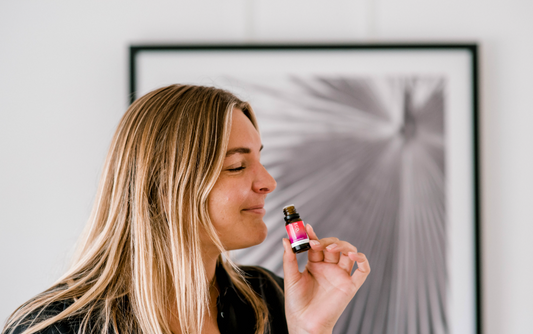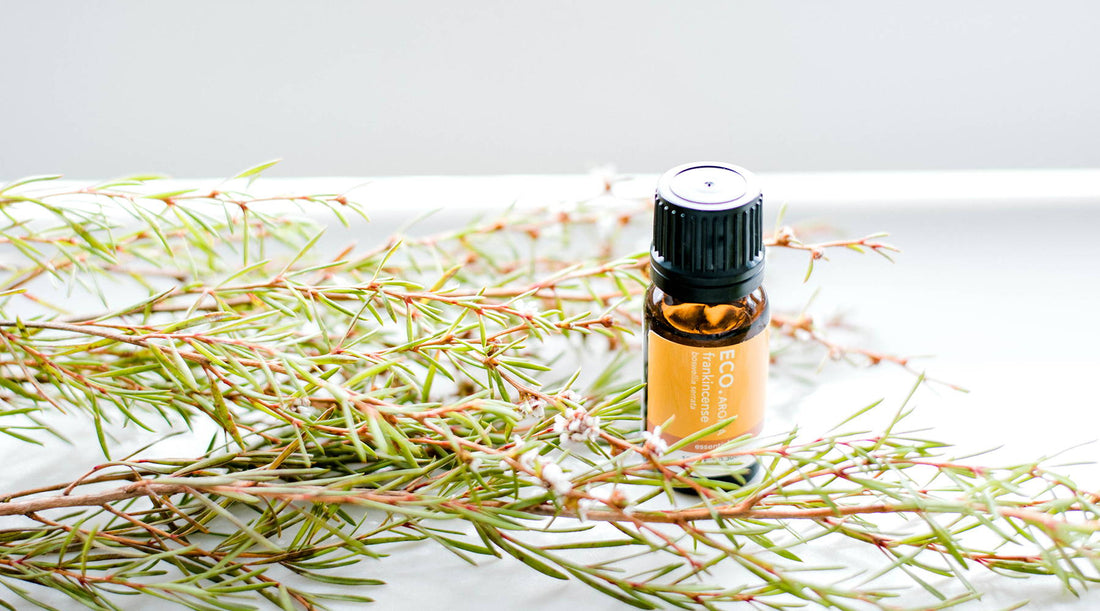
Benefits & Uses of Frankincense Essential Oil
Inhale the sweet, dry, balsamic fragrance of Frankincense. The resin was an integral part in the religious and domestic life of ancient Egyptians, Babylonians and other ancient Near Eastern cultures. This precious oil was considered a worthy gift for the newly born Jesus. The scent provides common ground for many religious traditions including Hinduism, Islam and Christianity. Consider the endless prayers, meditations and contemplations that have been made in a cloud of this enduring oil, an essential oil that you hold in your hands now. Frankincense connects us to a spiritual lineage stretching back thousands of years.
Where is Frankincense essential oil from?
Our Frankincense essential oil (Boswellia serrata (frankincense) oil) originates from deep within the heart of India, in the district of Shivpuri, Madhya Pradesh. Here, Frankincense grows wild in abundance. The word Frankincense is derived from the French ‘franc encens,’ meaning ‘high-quality incense’ and has long been treasured as a jewel often more valuable than gold.
How is Frankincense essential oil made?
To harvest, cuts are made into the trunk allowing the resin to seep out. The resin takes a few weeks to dry on the tree. To produce the essential oil the resin is steam distilled. The harvesting process must be limited each year in order to preserve the health of the trees. The trees themselves are long lived and tend to grow in hostile environments such as the desert. Harvesting Frankincense is a laborious process because the trees can be hard to access in remote locations. They are wild growing and uncultivated.
What does Frankincense look like?
Frankincense essential oil is extracted from a hardened gum-like material (resin) that comes from the trunk of the Boswellia tree. The Boswellia tree is kinked and knotty with papery, peeling bark and leaves.
What does Marjoram essential oil smell like?
With a warm, spicy, and woody aroma, Frankincense is what is known as a base note and sits with the wood/earthy types of essential oils.
History of Frankincense
Frankincense has a long and rich history with many references in religious and medical texts. For thousands of years, the resin and oil have played a part in the lives of people from various cultures. Frankincense resin was recommended to treat throat complaints and asthma about 3500 years ago. The resin was used to repair ceramics and boats, in cosmetics and an ingredient in the famous incense, kyphi. It was considered a cure for hemlock poisoning in late Roman society. The Persian physician Avicenna considered Frankincense to be beneficial in the treatment of tumours, ulcers and fever. There are also discussions about Frankincense in a 6th century Chinese herbal. The Frankincense trade was so valuable that there were stories about the trees being guarded by serpents and trade routes were shrouded in secrecy.
Frankincense essential oil benefits
- Frankincense is well known as a wound healing essential oil. The harvest process is an example of a principle known as the doctrine of signatures. In it, the healing properties of a plant can be determined by its characteristics. A ‘wound’ is made to extract resin and the essential oil of this resin is used to heal our wounds. Frankincense is reported to have properties that encourage skin regrowth (cicatrisant), promote wound healing (vulnerary) and are generally protective to cells (cytophylactic). Frankincense may encourage open wounds to close, improve the appearance of scars and combat skin infections that are slow to resolve. Adding essential oils in a dispersant to salty water could help improve the condition when applied to the wounded area. Massage oil around the wound may also act to prevent further spread of injury. Other essential oils that have wound healing properties include Lavender, Chamomile, Bergamot, Lemon, Patchouli, Rose and Thyme.
- Skin can feel tight and uncomfortable when it is too dry. This skin type tends to become irritated, sensitive and sore. The restorative properties of Frankincense essential oil may provide relief. Frankincense is the oil of choice for dry and mature skin types. As noted above, it can also be used in the treatment of scars and wounds. Apart from the skin healing action of Frankincense, this balsamic essential oil is anti-inflammatory, slightly analgesic and anti-oxidising, which helps keep skin looking nourished, moisturised and healthy. Enjoy the Frankincense oil benefits by adding it to skin care products such as in moisturizing cream, oil and face masks. The skin on the face is thinner than other areas so use essential oils in a low dilution and avoid applying it too close to the eyes. 1 to 2 drops of essential oil per application is plenty. If you are using a blend of 3 or more essential oils, blend them in a separate bottle and add a few drops of this blend to the the carrier before applying the product to your face. Other essential oils that are suitable for dry and mature skin types include Rose, Patchouli, Neroli, Chamomile and Sandalwood.
- Frankincense is an excellent choice for respiratory system complaints especially if they are provoked by stress and anxiety. Asthma, emphysema and hay fever may be improved with Frankincense. Those prone to chest infections due to being run down could benefit as well. The essential oil is useful for conditions where there is thick phlegm such as with bronchitis and other chest infections. Frankincense has anticatarrhal, antiseptic and expectorant properties. Frankincense essential oil diffuser benefits could be utilisedin the ‘sick room’ especially at night to promote relaxation and sleep. 2 drops may be added to a steam inhalation to clear the respiratory tract. A perfume applied to collar bones or close to the face may assist in the prevention of stress related respiratory conditions. There are many essential oils that support the respiratory system. Some commonly used essential oils are Eucalyptus, Peppermint, Rosemary, Sandalwood, Lavender and German Chamomile.
- One of the many notable properties of Frankincense is to boost the immune system. The reasons why some essential oils have an immune stimulating action are not entirely understood. Perhaps the essential oil increases blood flow or relaxes the body so that the immune system can function better. The antimicrobial property may assist our immune system to destroy infectious pathogens. Either way, the immunostimulant action of Frankincense is useful for people who have a lowered or compromised immune system. Common reasons for this include having chemotherapy, or being on medication that dampens the immune response such as with rheumatoid arthritis or multiple sclerosis. Being exposed to long periods of stress can also have the effect of lowering the immune system, making us more vulnerable to infections and poor health. We can benefit from the protective qualities of Frankincense by adding it to our perfume, massage oil blend, steam inhalations or dispersed in the bath. Other essential oils that support the immune system include Lemon, Tea Tree, Patchouli, Clove Bud and Vetiver.
- Depression, or even a touch of melancholy, can make it harder to enjoy the pleasures of life. As part of a multifaceted approach, aromatherapy can help heal the mind and heart. When essential oils are inhaled through the nose, the aromatic molecules stimulate the limbic system in the brain. The limbic system is associated with memories and emotions. In some studies, essential oils had a positive impact in the mood of research participants. Frankincense essential oil has often been cited as being particularly useful the holistic management of depression. It is difficult to pinpoint why Frankincense has this effect. The essential oil is considered grounding and calming. It has also been noted that Frankincense slows and deepens the breath which may be how it can reduce stress. Perhaps the scent simply provides comfort and invites introspection as it has for countless others over many generations. There are many ways to incorporate Frankincense essential oil into your health care plan. A diffuser, massage oil, perfume, bath or steam inhalation could be beneficial. Find out what works best and is easy to incorporate into your life.
- Frankincense is considered a very spiritual essential oil. The aroma has been used in many religious traditions and for the spiritual growth of people from numerous cultures. Frankincense can be utilised when we practice yoga or tai chi. It can be diffused when we meditate or pray. The sweet scent can help connection and concentration if we are consulting the tarot or runes. Perhaps we are trying to write a difficult letter to someone to mend broken bridges or are mentally stuck and seeking a way forward. All these examples are about the pursuit of divine connection and self knowledge. Frankincense has a way to slow the breath and still the mind. In this state who knows what treasures we might discover.
- Frankincense speeds up the secretion of digestive enzymes, which in turn assists the digestive system in detoxing and producing bowel movements, relieving nausea, flushing out excess water and reducing cramping and bloating.
- Frankincense helps soothe the mind and slow down breathing to promote a calm feeling, making it ideal for meditation. It helps to reduce heart rate and high blood pressure and can help to ease anxiety and depression.
- As Frankincense lowers the body’s anxiety and stress levels, this natural leads to a more rested sleep. It’s calming, grounding scent also helps open breathing passages, allowing your body to reach its ideal temperature for sleeping.
- Frankincense eases the symptoms associated with menstruation and menopause by helping to balance the body’s hormone levels. It can assist with relieving cramps and pain, headaches, anxiety, nausea and fatigue, as well as helping to regulate estrogen production.
Frankincense essential oil uses
- Diffuser: Add 6-8 drops of Frankincense essential oil to your diffuser.
- Quick fix: A few deep inhalations from the bottle can help when you are at work, in the car or anytime you need a quick break.
- Shower: Add 2-3 drops to the corner of the shower and enjoy the benefits of steam inhalation.
- Bath: Add 2-3 drops in a dispersant such as oil, to the bath to create a relaxing atmosphere while nourishing your skin.
- Topically: Mix 1 drop of chosen essential oil with 5ml carrier oil and apply to wrists, chest or back of the neck.
- Massage: Use a 2.5% dilution, 50 drops in 100ml carrier oil.
- Face massage: Add 1 drop in 5ml carrier oil.
- Steam Treatment: For face and respiratory system, add 1 drop of essential oil to a bowl of steaming hot water. Caution - due to risk of burns or scalding, keep eyes covered during treatment.
Blending Frankincense essential oil
The sweet, resonating fragrance of Frankincense can be enjoyed on its own. However, Frankincense acts as a base note in a blend due to its enduring heavy scent. Base notes tend to be grounding, calming and help us feel safe. Base notes provide the framework for other essential oils in a blend and as they tend to evaporate slower, less drops are needed. Frankincense blends well with the more gentle citrus oils like Sweet Orange, Lime and Mandarin. It combines nicely with other wood oils such as Cedarwood and Sandalwood. Frankincense enhances the beauty of other precious essential oils such as Jasmine, Rose and Neroli.
Is Frankincense essential oil safe?
Frankincense is considered a safe and gentle essential oil. It can be used during times of poor health, while pregnant and for people of all age groups.






